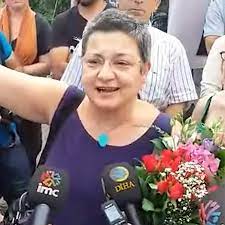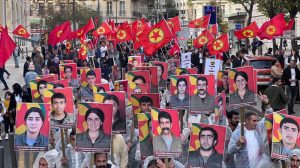This article by Sarah Glynn was first posted on bella caledonia. It describes the use of chemical weapons on Kurds living in northern Iraq by Erdogan’s repressive Turkish regime. The Russian imperial invasion of Ukraine is being used by the USA to cover up its imperial crimes and those of its allies, Israel in Palestine and Saudi Arabia in Yemen. Meanwhile both Biden and Putin are jockeying for Erdogan’s favour. This helps to explains why a blind eye is being turned to his crimes in Kurdistan.
TURKEY AND CHEMICAL WEAPONS: THE ACCUSATION NO ONE WANTS TO INVESTIGATE

On 27 October, Şebnem Korur Fincancı, the Head of the Turkish Medical Association, was remanded in custody, charged with terrorist propaganda. Her offense? After watching a harrowing video of dying Kurdish guerrillas, Fincancı had called for an independent investigation into allegations of Turkish use of chemical weapons. As Fincancı observed when the state responded to her comments on the video, ‘Opening an investigation into the one who is saying “an investigation should be made” gives the impression of concealing a crime’.
The video, which was published on 18 October, was taken by the Kurdistan Workers’ Party (PKK) in the northern mountains of the Kurdistan Region of Iraq, where the PKK have their bases and where they are under relentless attack from the Turkish military in what is tantamount to an invasion of a large area. The video claims to show soldiers delivering chemical weapons into the mouth of a cave, followed by footage of two affected PKK fighters in their dying minutes. A woman appears hysterical as she suffers from memory loss and uncontrolled movements, and a man is shown shaking jerkily and struggling to breath. The next day, the PKK released the names of 17 fighters who they claim had been killed by Turkish chemical attacks in the last few days.
This is the most recent addition to a growing accumulation of evidence which suggest that, as the guerrillas retreat into mountain tunnels to avoid Turkish drones, the Turkish military has resorted to forcing chemicals into the tunnels.
Chemical weapons have been banned since 1925, in response to the horrors of their use in the First World War, and Turkey is a signatory to the 1997 Chemical Weapons Convention. The Organisation for the Prohibition of Chemical Weapons (OPCW) in the Hague is the ‘implementing body’ for this convention. However, as the OPCW smugly pointed out in a recent tweet, in order for it to carry out an investigation, the request must come from a member state. The same stipulation applies for an investigation by the United Nations. No state has come forward to make a request on behalf of the Kurds.
As ever, political leaders do not want to upset Turkey – NATO ‘ally’, border-guard against migration into Europe, customer for European weapons. If an independent investigation by the OPCW or the UN were to find proof of Turkish use of chemical weapons, other states would be compelled to act; but, as things stand, international leaders and organisations can hide behind the absence of definitive evidence, even as they do nothing to help that evidence be collected and investigated.
It should make no difference for the ban whether the PKK is recognised as a non-state actor involved in a war – as ruled by Belgium’s highest court in 2020 – or labelled as a terrorist organisation, in line with Turkey’s demands – as Western states persist in doing. Like laws on human rights, the international ban on chemical weapons is universal.
Fincancı’s detention has served to spotlight the issue internationally: increasing the pressure for the independent investigation that she, and so many others, are calling for, and drawing attention to the existing circumstantial evidence.
Particular attention has been given to a report that was produced by two experts from International Physicians for the Prevention of Nuclear War (IPPNW), who visited the Kurdistan Region of Iraq from 20-27 September this year (before the release of the recent video). Dr Josef Savary is President of IPPNW Switzerland and a medical doctor with over forty years’ experience in emergency and rescue medicine. Dr Jan van Aken is a member of the scientific advisory board of IPPNW Germany and a former biological weapons inspector for UNMOVIC, the UN body that investigated Saddam Hussein’s chemical and biological weapons in Iraq.
For those in search of evidence, an added layer of complication has been introduced by the Kurdistan Democratic Party (KDP), which dominates the Kurdistan Regional Government, and which has allowed itself to become effectively a vassal of the Turkish state, even assisting the Turkish military extend their control over the region. The KDP-dominated authorities denied the physicians access to the area where the alleged attacks took place and so they were unable to carry out their planned interviews, however they have put together a concise analysis of other evidence of Turkish use of chemical weapons.
They stress that there has even been an acknowledgement by Turkey’s own Minister of Defence, speaking to the Turkish Parliament on 16 February 2021, that tear gas had been used against the PKK a few days earlier at the entrance to a cave on Mount Gara. Although tear gas is allowed to be used in riot control – presumably on the dubious grounds that this will be kept within relatively safe limits – It is not allowed to be used in war, and it can be lethal in enclosed conditions. The report also gives evidence of past use of teargas by the Turkish military.
In addition, the physicians note circumstantial evidence recorded by the PKK consisting of abandoned containers from Hydrochloric acid and bleach (which could be used for making chlorine) and an empty container from a gas mask cartridge, which were found last autumn by the entrance to a cave where PKK fighters had died. And they cite another video, filmed by the PKK in July, that appears to show Turkish soldiers with an improvised device for pumping gas into a PKK tunnel.
More evidence can be found in an earlier report that was produced for London-based Peace in Kurdistan by journalist Steve Sweeney and published in May 2022. This has been less cited, as it does not claim political neutrality, but Sweeney was able to talk to victims – not in the PKK bases but in neighbouring villages where civilians also claim to have been affected by chemical attacks.
The Peace in Kurdistan report includes testimonies from some of these villagers and from one of the doctors who treated them. The testimonies were mostly recorded in December 2021. As the interviewees explained, the Kurdistan Region of Iraq is an area where people are, sadly, already familiar with the nature of chemical attacks from the time of Saddam Hussein. They described breathing difficulties, lungs like fire, watery eyes, intense burns, persistent coughing, and symptoms that have left them totally incapacitated. An experienced doctor claimed to have treated around twenty people from what he was sure was exposure to chemical attack. He described burns, breathing difficulties, and marks on patients’ bodies, and he claimed that the doctors had been told not to say that these symptoms were from chemicals, and that the doctors’ account of what they had found had been confiscated by the authorities, who had forced them to amend it. The report also notes examples of previous accusations of Turkish use of chemical weapons, including in Syria in 2018 and 2019.
Earlier, in September 2021 , the (pro-KDP) Rudaw news agency produced a long articleon one of these suspected chemical attacks against local villagers, noting both the symptoms suffered by the victims and the reluctance of the authorities to investigate. And in October 2021, three PKK survivors described their experience of an alleged chemical attack that wrought sustained damage to their health and brought a painful death to six of their comrades.
Despite all of this, attempts to raise the issue in national or international parliaments have been stalled by the response that there is no independent evidence. When two Labour MPs asked a question in the House of Commons on 8 November, the government spokesperson brushed it off with the curious comment “The Government are aware of reports that Turkish forces have used white phosphorus in northern Iraq. However, we have no direct evidence to support those claims”. Although white phosphorus has been mentioned in the past, it was not the subject of this question.
Over the last two years, there have been numerous demonstrations and vigils to try and force international organisations to act. Last December, in a desperate attempt to get the Kurdish experience heard, around fifty young protestors – mainly Kurds – forced their way into the compound of the OPCW building. Before they could go further, they were arrested by the Dutch police. Forty-four were detained, and four of these were remanded in custody for nearly eight weeks.
Europe-wide demonstrations against Turkish chemical attacks in Kurdistan: in Germany, France, Greece, Sweden, Finland, Greece, Cyprus, Austria and Norway, Kurds and people in solidarity have demanded an immediate intervention against the Turkish chemical weapons attacks in Kurdistan.
Since the publication of the recent video, the protests have been growing. A day of action on Saturday saw protests across Europe, with 25,000 marching through Dusseldorf, and thousands in Marseille; and also tens of thousands in Qamishlo in northern Syria. Musicians in Qamishlo have recorded a song about the attacks, whose accompanying video depicts vignettes of Kurdish life in which all the actors are wearing gas masks. But, despite a few notable exceptions, such as the World Medical Association and the European Association of Lawyers for Democracy & World Human Rights, the issue is yet to cause significant waves beyond the Kurdish community.
That needs to change. The more people know what is happening, the harder it will be for governments to continue to look the other way and to refuse even to call for an investigation. It seems extremely unlikely that any positive move will come out of the UK government, but we live in an interconnected world, so action everywhere can help. We can all spread the word that Turkey has been repeatedly accused of using chemical weapons, that the evidence is piling up, and that an independent investigation is urgently needed.
14.11.22
___________
also see:
Remembering Jihan Tolhildan – Sarah Glynn, bella caledonia
Turkey makes ready to destroy Rojava – Sarah Glynn, bella caledonia

